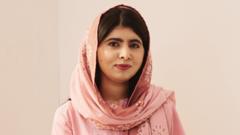Malala Yousafzai, the Nobel Prize-winning activist, is once again using her voice to bring attention to the plight of Afghan women who have faced severe restrictions following the Taliban's return to power. Her personal experience with the Taliban makes her an influential supporter for those struggling in this dire situation. Since the Taliban regained control of Afghanistan in 2021, the situation for women has worsened dramatically. Many of the freedoms they enjoyed, including education and the right to work, have been stripped away.
Malala, who was shot by a Taliban gunman at the age of 15, expressed her shock at how quickly women's rights could be compromised, stating that many girls see no way out of their hopeless situations. The UN describes the severe restrictions placed on women as "gender apartheid," while the Taliban defends these measures as aligned with Afghan societal values.
In her upcoming documentary, "Bread & Roses," Malala highlights the struggles of three Afghan women living under oppressive laws. The film aims to shed light on the broader experiences of the 20 million Afghan women whose stories often go unheard. The documentary points out the connection between the loss of educational opportunities and rising issues like child marriage and maternal mortality.
Sahra Mani, the film's Afghan director, emphasizes the urgency of their mission, explaining the implications of women's rights losing ground every day. The project shines a spotlight on the comments made by women in protests, many of whom are now living in exile.
Malala asserts that it is essential for the international community to exert pressure on the Taliban to restore women's rights in Afghanistan. Despite the bleak situation, Afghan women continue to show remarkable defiance in the face of adversity. The film's message resonates with solidarity, encouraging viewers around the world to support marginalized voices.
As the documentary approaches its release on November 22, there's hope it will inform people about the strength and resilience displayed by Afghan women, serving as a rallying cry for those who stand for equality and rights worldwide.
Malala, who was shot by a Taliban gunman at the age of 15, expressed her shock at how quickly women's rights could be compromised, stating that many girls see no way out of their hopeless situations. The UN describes the severe restrictions placed on women as "gender apartheid," while the Taliban defends these measures as aligned with Afghan societal values.
In her upcoming documentary, "Bread & Roses," Malala highlights the struggles of three Afghan women living under oppressive laws. The film aims to shed light on the broader experiences of the 20 million Afghan women whose stories often go unheard. The documentary points out the connection between the loss of educational opportunities and rising issues like child marriage and maternal mortality.
Sahra Mani, the film's Afghan director, emphasizes the urgency of their mission, explaining the implications of women's rights losing ground every day. The project shines a spotlight on the comments made by women in protests, many of whom are now living in exile.
Malala asserts that it is essential for the international community to exert pressure on the Taliban to restore women's rights in Afghanistan. Despite the bleak situation, Afghan women continue to show remarkable defiance in the face of adversity. The film's message resonates with solidarity, encouraging viewers around the world to support marginalized voices.
As the documentary approaches its release on November 22, there's hope it will inform people about the strength and resilience displayed by Afghan women, serving as a rallying cry for those who stand for equality and rights worldwide.


















